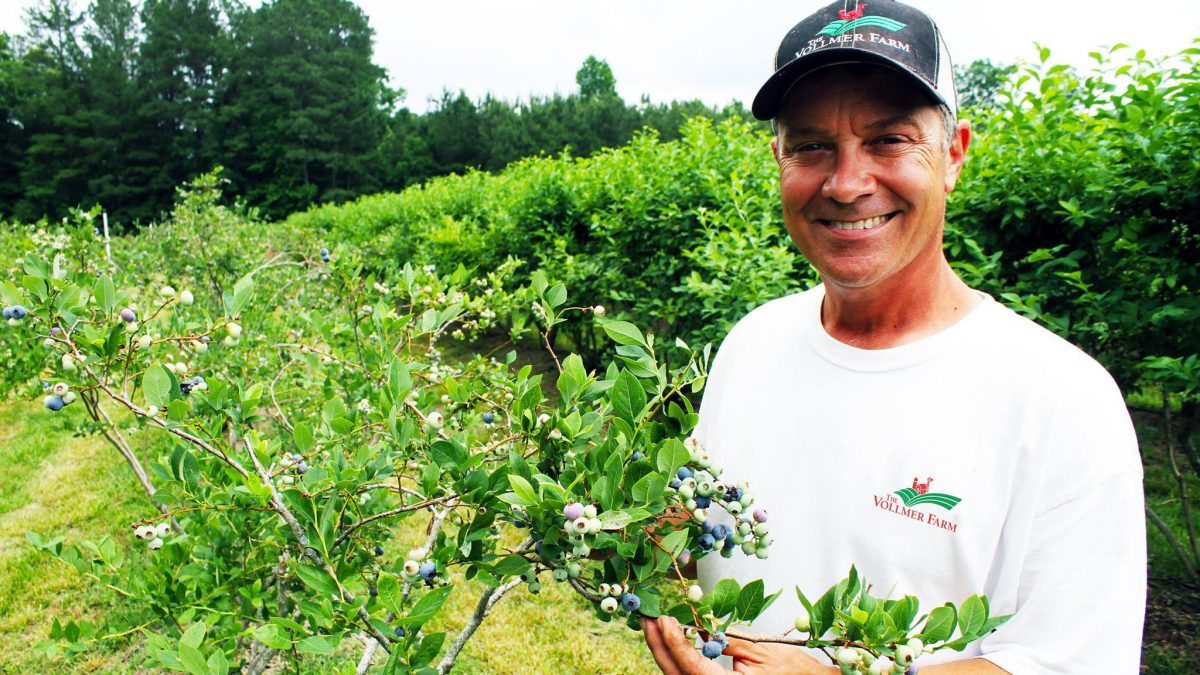Growing hope, farmer to farmer
Carolina’s Peers for Progress is helping North Carolina farmers support each other by reducing isolation and improving mental health.

Farmers endure high emotional and physical stress, sizable debt, weather extremes and shrinking commodity prices while working to make a farm turn a profit. Add in rural isolation and farmers’ often taciturn independence, and the combination can take its toll.
The Peers for Progress program in the UNC Gillings School of Global Public Health is lending its expertise to the North Carolina Agromedicine Institute’s Farmer to Farmer project, which trains and matches peer farmers to support fellow farmers in dealing with stresses only they know. Peer farmers were recruited and trained in fall 2020 before the program launched in January.
Ten farmers so far have volunteered to be peers for 14 counties, with 10 others expressing interest in the program. Institute personnel promote Farmer to Farmer when they meet with farmers around the state, through the behavioral health care providers with whom they work, and through organizations such as the North Carolina Cooperative Extension, North Carolina Farm Bureau Federation, Carolina Farm Credit and North Carolina Farm Service Agency.

Patrick Tang
The Well talked with Patrick Tang, Peers for Progress program manager, about why and how his team recruited and trained peer farmers.
How did Gillings personnel get involved in the Farmer to Farmer program?
The collaboration between North Carolina Agromedicine Institute and Peers for Progress began when Samantha Luu, our associate director, saw a WRAL spotlight on farmer mental health that featured Robin Tutor-Marcom, the institute’s director, and Russ Vollmer, a farmer in Bunn, North Carolina. Robin’s work on farmer, farmworker and farm family health saw the community grappling with stress that is quickly approaching levels of the farming crisis in the 1980s. Samantha contacted Robin to offer Peers for Progress’s help with the services that farmers were requesting.
After several phone calls and a meeting between the institute and PfP, we agreed on a scope of work in which PfP would provide expertise to program design for the institute while the institute instructed PfP about the landscape of rural mental health and the agro-workforce that aims to keep people globally fed and healthy.
Why is the program important?
Nationally, trends indicate that farming communities face higher rates of mental health needs and fewer means to access care, leading to elevated rates of suicide compared to the general population. Stress, loneliness and suicide are important mental health-related issues that farming communities face during a farm crisis, as documented by Farm Aid and the institute. Stress has been well documented in the farming community as a result of numerous uncontrollable stressors — financial, climate, legal and interpersonal.
We learned from Tutor-Marcom that farmers are a unique group for whom pride, individual problem-solving and faith are key values. Due to their unique lifestyle and culture, farmers often have difficulty connecting with health care providers who don’t understand the agricultural lifestyle. Fellow farmers, people who have lived experience of the agriculture lifestyle and are motivated to help other farmers in their community, can help bridge this gap.
Peer support has been suggested as a method to prevent suicide by decreasing social isolation. It’s a service that North Carolina’s farming community has sought out to complement existing behavioral health providers. Peer support has been cited as an effective strategy for reaching those who are marginalized by social determinants and is recognized by the Robert Wood Johnson Foundation as a strategy that works to alleviate health care-related disparities in rural areas, especially those at high risk. Similarly, international research has found that peer support interventions have produced the greatest gains in the most marginalized groups.
What expertise and support does Peers for Progress provide?
This is the first opportunity that PfP has had to work with U.S. farming communities, challenging us to translate our prior experiences to a new population and setting. PfP brought expertise from prior experience developing interventions for:
- Latinx adults with diabetes served through a federally qualified health center in Chicago,
- adults in New Jersey with diabetes using an integrated digital app and health coaching program,
- community-based peer support for adults with diabetes in Shanghai and
- telephone peer support for high-risk groups in New Jersey.
On this project, PfP provided the institute with formative evaluation, intervention and protocol development, personnel training and ongoing technical assistance through the program’s launch in early 2021.
What are the project’s goals?
Ultimately, the institute and PfP envision that a farmer-centered peer support program will transform rural farming communities in the short term by alleviating individual stress. Long-term outcomes include fostering positive social norms toward mental health, preventing suicides, bolstering local economies and complementing existing behavioral health care systems.
While the program pilot focuses primarily on farmers, farm workers and farm families, the potential impact of this collaboration could be felt across industries as the institute’s mission is to serve farmers, fishers and foresters and their families in all 100 counties of North Carolina. The institute hopes to adapt and implement such a program statewide for all their beneficiaries in the future.




